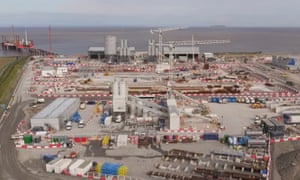
Electricity consumers 'to fund nuclear weapons through Hinkley Point C'
Posted: 13th October 2017
From the Guardian.
Scientists tell MPs government is using expensive power project to cross-subsidise military by maintaining nuclear skills

The government is using the “extremely expensive” Hinkley Point C nuclear power station to cross-subsidise Britain’s nuclear weapon arsenal, according to senior scientists.
In evidence submitted to the influential public accounts committee (PAC), which is currently investigating the nuclear plant deal, scientists from Sussex University state that the costs of the Trident programme could be “unsupportable” without “an effective subsidy from electricity consumers to military nuclear infrastructure”.
Prof Andy Stirling and Dr Phil Johnstone from the Science Policy Research Unit at the university write that the £19.6bn Hinkley Point project will “maintain a large-scale national base of nuclear-specific skills” without which there is concern “that the costs of UK nuclear submarine capabilities could be insupportable.”
Their evidence suggests that changes in the government’s policy on nuclear power in recent years will effectively allow Britain’s military nuclear industry to be supported by payments from electricity consumers.
Last June, MPs passed a motion in favour of replacing four submarines carrying Trident missiles at a cost of £40bn.
“What our research suggests is that British low-carbon energy strategies are more expensive than they need to be, in order to maintain UK military nuclear infrastructures,” said Stirling.
“And without assuming the continuation of an extremely expensive UK civil nuclear industry, it is likely that the costs of Trident would be significantly greater.”
The Hinkley Point project has been criticised for its huge cost. The French electricity company EDF is currently in the early stages of constructing the plant near Bridgwater, Somerset, in partnership with the China General Nuclear Power Group.
The government has agreed a minimum price of £92.50 per megawatt hour (MWh) for electricity produced by Hinkley Point, the first new-build nuclear power plant in the UK since 1995. Under this agreement, if the usual wholesale price is lower, the consumer pays the difference in price. The current wholesale electricity price is around £42 per MWh, so the electricity consumer would pay EDF an extra £50 per MWh.
Last month, the government agreed a “strike price” of £57.50 per MWh for offshore windfarms off Scotland and Yorkshire, far below the Hinkley guaranteed price.
This week, the Green MP Caroline Lucas asked the government about the Ministry of Defence and the business department discussing the “relevance of UK civil nuclear industry skills and supply chains to the maintaining of UK nuclear submarine and wider nuclear weapons capabilities”.
Harriett Baldwin, the defence procurement minister, answered that “it is fully understood that civil and defence sectors must work together to make sure resource is prioritised appropriately for the protection and prosperity of the United Kingdom”.
Johnstone said the decision-making process behind Hinkley raised questions about transparency and accountability, saying: “In this ever more networked world, both civil and military nuclear technologies are increasingly recognised as obsolete. Yet it seems UK policymaking is quietly trying to further entrench the two – in ways that have been escaping democratic accountability.”
At a hearing held by the PAC in parliament on Monday, senior civil servants defended the Hinkley deal after a National Audit Office report concluded that it was “risky and expensive”.
The officials admitted that the economic case had become “more marginal” in recent years, as the costs of alternative technologies had fallen.
When she became prime minister last year, Theresa May asked for a review of the project.
When asked why the strike price had not been renegotiated at that point, Stephen Lovegrove, the former permanent secretary at the now-disbanded Department of Energy and Climate Change, told MPs that the deal would have fallen through if the government tried to reduce payments to EDF. “Candidly, the idea the deal would not have collapsed if we had sought to renegotiate it is fanciful, actually.”
May allowed Hinkley Point to proceed after the three-month review.
The civil servants said the costs were higher because the companies agreed to carry the risk for the project, as required by ministers. “This deal is a very good one within the policy constraints of the time,” said Lovegrove.
At the PAC hearing, the Labour MP Meg Hillier asked whether “Hinkley is a great opportunity to maintain our nuclear skills base”.
Lovegrove answered: “We are completing the build of the nuclear submarines which carry conventional weaponry. So somehow there is very definitely an opportunity here for the nation to grasp in terms of building up its nuclear skills. I don’t think that’s going to happen by accident. It is going to require concerted government action to make that happen.”